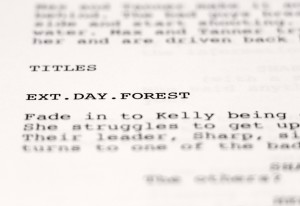 Screenwriting is a journey which can be difficult, challenging, long and, at times, lonely. Yet, if you’re a writer, you’ve already come to terms with that. For many creatives (visual, musical or otherwise) working alone is a method born from habit, and in other instances it is a practice which allows individuals to exercise and develop a given skill, and explore it without judgment. Nevertheless, once that muscle has been worked out, sharing it with others becomes more natural, less fearful and potentially helpful.
Screenwriting is a journey which can be difficult, challenging, long and, at times, lonely. Yet, if you’re a writer, you’ve already come to terms with that. For many creatives (visual, musical or otherwise) working alone is a method born from habit, and in other instances it is a practice which allows individuals to exercise and develop a given skill, and explore it without judgment. Nevertheless, once that muscle has been worked out, sharing it with others becomes more natural, less fearful and potentially helpful.
Of course, not everyone enjoys working publicly or in partnership with others. For some, solitude allows them space to fully express an idea without distraction. Indeed many examples of amazing work have come as a result of working solo. However, the same could be said for working in partnership with someone else or a group of individuals. Take the latest Star Wars film, for example. Though the original franchise was written alone by the series creator George Lucas, the most recent film–the largest in the franchise’s history and one of the biggest movies of all time–was a collaboration between the director J.J. Abrams, long-time partner Lawrence Kasdan and Toy Story 3’s Michael Arndt. In fact, of the seven films, only 3 have been written by Lucas alone.
Like all partnerships, writing along with someone provides an opportunity for different perspectives, fresh ideas, and immediate feedback. No two people are the same, and while this may take some getting used to if working with others is a new venture, the process could be a learning experience, if nothing else. Still, it’s important to go about collaboration wisely and correctly to ensure that the attempt is not in vain.
First things first, one has to select a partner whom they trust and with whom they can be completely comfortable. The creative journey calls for an environment that allows the creator to be free. If you find yourself holding back thoughts or opinions for fear hurting your partner’s feelings or appearing a certain way, that is not the right partner for you. Find someone with whom you can be natural, which will create a situation in which each of you complement one another instead of being a hinderance.
Secondly, communicate early and often. Again, remember that no two people are the same. You may think the both of you understand the plot or certain conflicts the same way, but it’s important to check-in with the other person (a few times) to be absolutely sure. One of the worst things that can happen, especially if each you decide to work remotely, is to end up with to different movies or a conflicting one. Communication, though slightly more time consuming, should not be discounted; it makes all the difference.
Likewise, when it comes to discussing terms, everything should be expressed clearly and decided upon before the undertaking begins. Even if the partner with whom you’re working is a friend or family, every person should see the endeavor as professional; otherwise, why bother? If you’ve never created an agreement, don’t worry. The Writers Guild of America has a handy, non-intimidating one available to the public on their website.
Note that partnerships are not required nor standard for writing a screenplay. They are merely a tool for heightening creativity and the likelihood of a good story. The most important take away is to choose a partner and/or project that’s most beneficial for all involved, and to approach the process professionally but comfortably. And may the force with be with you!

